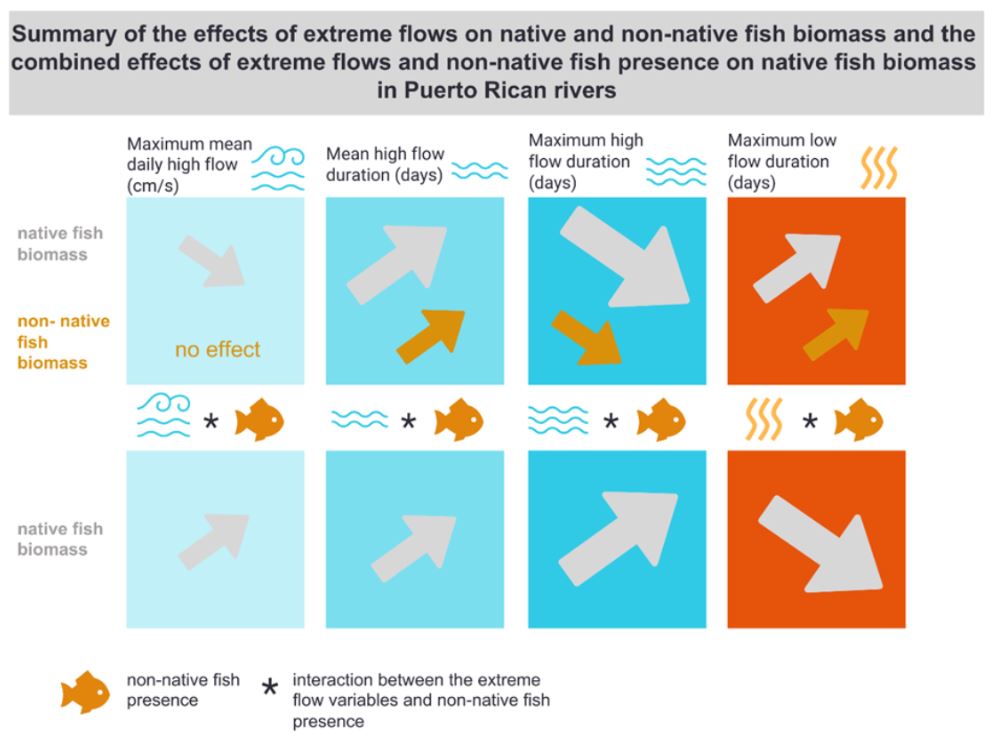Shaking in their Gills: Effects on Native Fish When They Have Unexpected Guests

This blog was written by Eleana Paneda from San Jose State University as part of her science communication internship with the Southeast CASC during the summer of 2024. Eleana researched, interviewed, and wrote this story.
Climate change is affecting rainfall amounts across the Caribbean, leading to more frequent and prolonged drought and flood events. These extreme flow events directly impact aquatic species, especially imperiled native freshwater fishes. According to a new study, freshwater native fish in Puerto Rico respond differently to extreme flow events (droughts and flooding) when non-native fish are present.
Extreme flow events like droughts and floods change fish behavior, mortality rates, and the types of species present in any given waterbody during normal circumstances. But, the Caribbean is projected to experience overall drying and increased droughts in the future due to climate change. So, understanding how native fishes respond to extreme flow events, and what influences those responses, will be key to conserving native biodiversity in these aquatic environments.
In this study, researchers found that native fishes may cope with long droughts, but only when non-native fish are absent. Native fish populations may even increase as droughts get longer and still survive. However, native fish survival is reduced when non-native fish are present during long droughts.
Conversely, long periods of flooding may act as a buffer against non-native fish and reduce their negative effects on native fish populations. The researchers hypothesized that this may be due to the native fishes’ flood-resilient life history traits. For example, floods can trigger native fish in Puerto Rico to reproduce. Native fish have also evolved to instinctually shelter in place during floods, allowing larval fish to survive areas that experience frequent or intense flooding. If extreme high-flow events continue or increase in the future, native fish populations may see benefits, to a point.

Native fishes are important to the overall ecology and health of islands. They act as transports for nutrients from marine to freshwater environments and vice versa because they are “amphidromous.” This means that they spend part of their lives in the sea before returning to islands and swimming upstream to headwaters of rivers. The presence of non-native fish or extreme low flows, however, inhibit their ability to swim upstream, as the water levels are either too low or non-native fish populations aggressively limit habitat during low water levels.
The findings of this study are significant not only to ecosystem managers in Puerto Rico and the Caribbean but can also be applied to other tropical islands. The researchers found that dams, which cut off connectivity between freshwater rivers or freshwater rivers and oceans, was a major contributor to decreased native fish populations and increased non-native fish populations. To address these stressors, managers could formulate strategies to better control the introduction of non-native fish populations and stop their spread and improve connectivity in the rivers by managing flow from dams
Despite their vulnerability, tropical aquatic ecosystems are among the least researched in the world. The impacts of extreme flow events and the invasion of non-native fishes on freshwater fishes explored in this paper must be understood to protect these ecologically and culturally important species. In the future, studies focusing on the timing of flood events that promote upstream migration of amphidromous fish and the mechanisms behind non-native fish effects on native fish can provide more insight into the relationship between flows and fish populations.
This research was funded by the U.S. Geological Survey National Climate Adaptation Science Center (#G18AC00115) and the U.S. Fish and Wildlife Service, Region 4 Science Applications and USDA Forest Service, International Institute of Tropical Forestry.
The paper, “The effects of flow extremes on native and non-native stream fishes in Puerto Rico” was published on July 19, 2024 in Freshwater Biology. The paper was co-authored by Bonnie Myers, Alonso Ramírez, and Ambar Torres-Molinari of NC State University, Augustin Engman of University of Tennessee-Knoxville, Abigail Lynch of the National Climate Adaptation Science Center, Mitch Eaton of the Southeast Climate Adaptation Science Center, Patrick Cooney of Smith-Root, and the late Thomas Kwak from the NC Cooperative Fish & Wildlife Research Unit.
This post was originally published in SE CASC.


